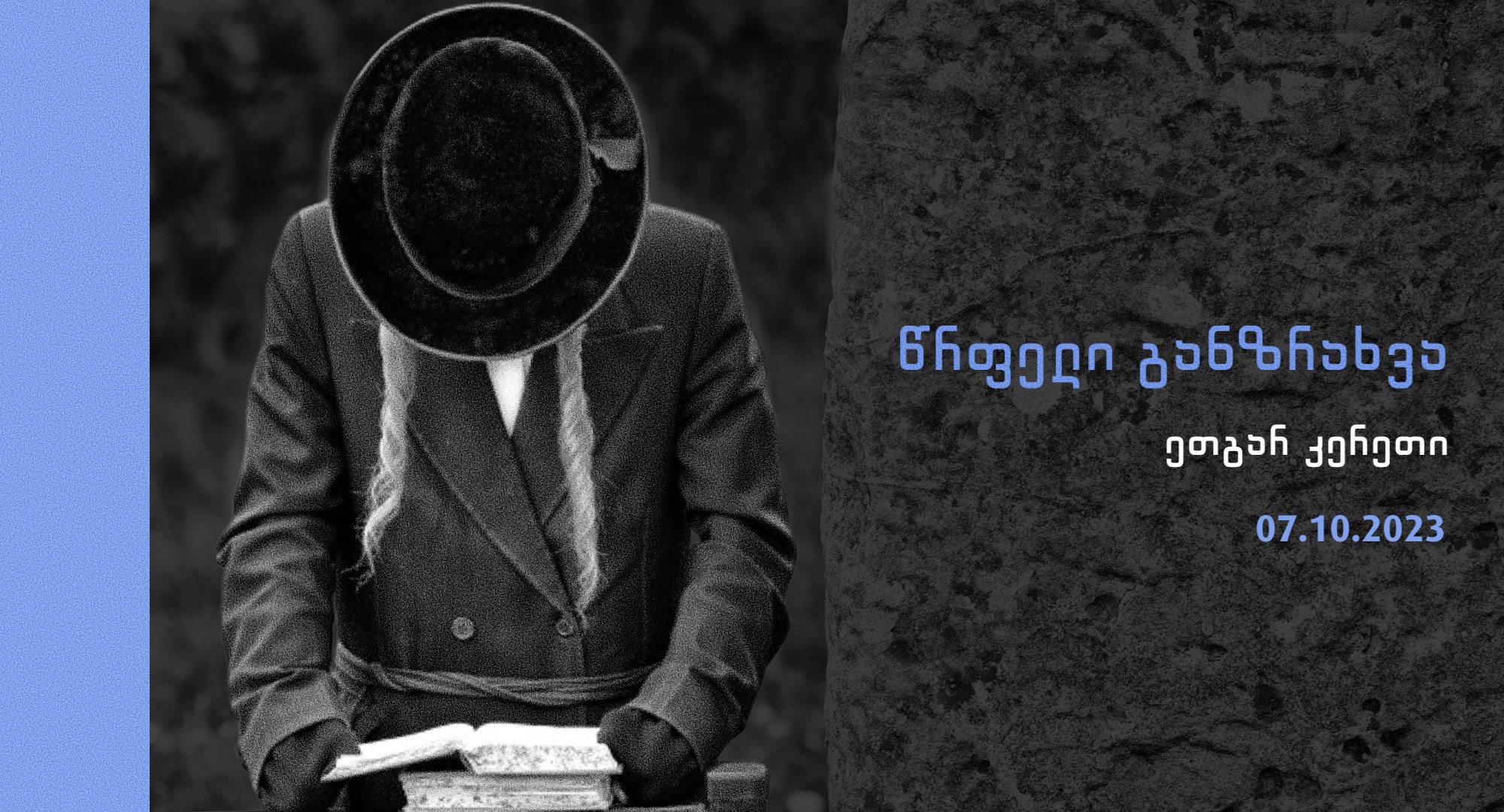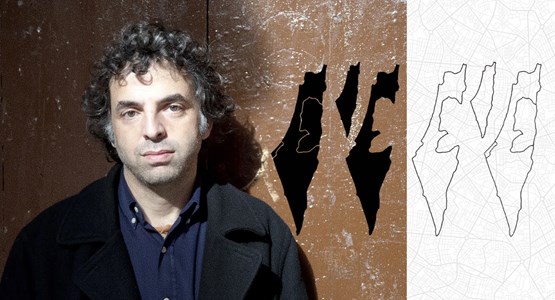
Intention | Etgar Keret
Intention: a short story written in the aftermath of Hamas’s 7 October attack on Israel by Etgar Keret
For 20 years, Yechiel-Nachman prayed to his God. Twenty whole years in which not a day passed without him praying for marriage, for livelihood, for good health, and for peace upon Israel. But nothing happened: Yechiel-Nachman remained a penniless, asthmatic bachelor, and peace was nowhere on the horizon. Yet still he communed with God each and every day, never missing a single one of the three daily prayers.
Deep in his heart, Yechiel-Nachman had made peace with his prayers going unanswered. Because prayer was the pure yearning for compassion and justice, whereas life was life: cruel, dispiriting, insulting. It was therefore only natural that two such contrasting worlds could never converge. But on October 7, 2023 – the 22nd day of Tishrei in the year 5784 – something in Yechiel-Nachman broke. On that morning, when the joyous holiday of Simchat Torah was to be celebrated, hundreds of his people were slaughtered, with many more snatched from their homes and taken to an enemy city.
Even before he’d had time to absorb the dreadful news, Yechiel-Nachman found himself wrapped in a prayer shawl on the balcony of his little apartment in Beit Shemesh, neither eating nor drinking, only praying and praying for hours on end. He pleaded with the Creator: Those whom You have taken – You have taken, but please have mercy on all the innocents stolen from their beds at first light, and please bring them back home.
The next morning, after 20 consecutive hours of prayer, Yechiel-Nachman opened the Home Front app on his phone, only to find that nothing had changed.
He put on his coat and walked quickly to the home of his rabbi, Rabbi Nechemia Mittelman. “Rabbi,” he said to Mittelman, “I no longer have faith. Before I remove my yarmulke and cut off my sidelocks, I have come to say goodbye.” The rabbi gave Yechiel-Nachman a probing look and asked serenely what had made him lose his faith. Distraught, Yechiel-Nachman replied: “All night long I prayed to the Holy One for the souls of the hostages. I prayed for Him to keep them safe, to set them free. And I did not pray in my usual half-hearted way, but with true and whole intention. But even so, nothing happened. I beg your forgiveness, Rabbi, but I no longer believe. I do not believe in a God who hardens his heart to prayer as pure as mine.”
“With whole intention…” the rabbi repeated, stroking his beard. “May I ask exactly how whole this intention was?”
Yechiel was offended. “How whole? Completely whole.”
“Completely whole it was not,” said the rabbi, shaking his head sadly, “for if it had been, it would have been granted. Your prayer must have been almost whole. More whole than usual, perhaps, but still, not whole enough.” He placed a fatherly hand on Yechiel-Nachman’s shoulder. “I suggest, Yechilik, that instead of cutting off beards and sidelocks, you put a little more effort into your prayers. Judging by the tremor in your voice, I sense that you are very, very close.”
And so Yechiel-Nachman went back to his little apartment, put on his prayer shawl again, and resumed his prayers. While he prayed, he searched for rifts in his faith and cracks in his intention, and found that even though most of the time he really was praying wholeheartedly, at certain moments his heart was divided: while his lips whispered “and they shall return from the enemy’s land”, his heart contemplated the long, swanlike neck of the smiling cashier at Osher Groceries, and his spiteful landlord, and the prescription he should have refilled at the pharmacy long ago. From the moment Yechiel-Nachman became aware of the selfish thoughts disrupting his prayer, he began to focus on them so as to gradually remove them from his mind.
Like a man trying to push a heavy load up a hill, Yechiel-Nachman sweated and panted as he prayed. He sweated and panted, he panted and sweated, until the profane thoughts were completely uprooted from his heart and could make way for more intention and more faith, which eventually washed over his entire being. And the prayer itself became instantly different – no longer a series of verses from the prayer book, but a genuine, aching supplication. And this supplication, like any pure supplication, was boundless, not sufficing with the welfare of his kidnapped brethren and his nation, but begging for the weal of all human beings, including his enemies. Yechiel-Nachman kept uttering his prayers in awe, like a rider who has lost control of his horse, and he listened curiously to his own pleas, as if they were being uttered by someone else. At the end of a prayer that lasted 30-odd hours, Yechiel-Nachman turned on the Home Front app and found that two of the hostages had been released, and that at those very moments there were negotiations with the enemy for a ceasefire.
When he walked into the synagogue that evening, Yechiel-Nachman noticed Rabbi Mittelman watching him tenderly. When their eyes met, the rabbi smiled and nodded. All the way home, Yechiel-Nachman felt as if he were no longer walking on a filthy concrete sidewalk, but hovering above the clouds of heaven. Now, he thought, with the big problems on their way to being solved, I can devote my next prayer to myself.
Though he was utterly exhausted, instead of going to sleep that night, Yechiel-Nachman prayed as hard as he could for a wife and children. At first he tried to ask the Creator to match him with the cashier from Osher Groceries. But his prayer, like any true prayer, chose words and intentions more worthy than any Yechiel-Nachman could have, and insisted on allowing the Creator to find him a suitable match.
Yechiel-Nachman felt a spiritual elevation while he prayed, as though he’d managed, for the first time in his life, to envision not the details of the life he longed for – but the spirit. He did not pray for a woman but for marriage, not for children but for wise, loving parenthood. He prayed and prayed without stopping, until he found himself lying on the floor with a bruised forehead. While the neighbour from upstairs bandaged his wound, she told him he’d had a serious fall and he must see a doctor immediately. Yechiel-Nachman thanked her and explained that he was very tired and likely a little dehydrated: all he needed was to drink some water, eat a little, get some rest, and he would be fine.
After leaving the neighbour’s apartment, Yechiel-Nachman went to Osher Groceries, where he bought a few packets of frozen schnitzel and a six-pack of mineral water. When he paid, the long-necked cashier flashed her radiant smile and said he must really like schnitzel. Yechiel-Nachman smiled back and said he did like schnitzel, but he liked other things, too. There were no other customers in the shop, and they got to talking about food –specifically, kosher sushi. Yechiel-Nachman promised the cashier that next time he came to do his shopping, he would bring her a bottle of special rice vinegar that was sold only in Jerusalem, which made the grains of rice stick to each other like magnets to a fridge door.
At night, lying in bed with his eyes open, Yechiel-Nachman thought to himself how wonderful and simple this world was, and how much suffering and hardship he’d had to endure every single day of his life, all because he hadn’t known what to ask for or how to ask for it. That was the last thought that went through his mind before he shut his eyes forever.
The doctor explained to Yechiel-Nachman’s grief-stricken parents that when he’d fallen and hit his head, he must have suffered a traumatic brain injury, and that if, instead of going to sleep, he’d listened to the neighbour and gone to the emergency room, he would still be alive. When she finished speaking, the doctor gave a sorrowful grimace.
Yechiel-Nachman’s spirit, though, was not at all sorrowful. It was now in the afterworld, where all was good. Not 99% good, but completely good. Wholly good. And in that world, Yechiel-Nachman spent hours upon hours deep in conversation with the Creator, to whom he presented all the complaints and disgruntlements of all human beings. And God listened with infinite patience and nodded His head compassionately. He listened all the time, even when He had not the faintest idea what Yechiel-Nachman was talking about.
Etgar Keret is an Israeli writer of short stories, graphic novels and screenplays. He has won numerous awards, including the Ordre des Arts et des Lettres in 2010 and the Sapir prize in 2018.
English translation by Jessica Cohen
We Recommend

Next Time | Etgar Keret
25.05.2021



